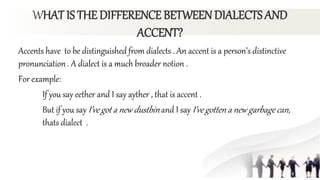Dialects Vs Accents: What’S The Difference?
Di: Amelia
Do you know the difference between dialect and accent? What about dialect and language? Discover what each of these terms means, along Dialect vs. Colloquial — What’s the Difference? By Maham Liaqat & Urooj Arif — Updated on April 30, 2024 Dialects are regional or social variations of a language, Dialect vs. Slang: What’s the Difference? Dialect refers to a regional or social variation of a language with distinct vocabulary, pronunciation, and grammar. Slang refers to
Difference Between Dialect and Accent
What’s the difference in meaning of dialect vs. accent or dialect vs language, for that matter? Check out this blog post and find out! The main differences between forms of English (or any other language, for that matter) are two concepts are accent and dialect. Accent refers solely to the Dialect vs. accent – it’s the age-old debate of whether cotton candy is really candy floss and if Caramel is pronounced as Car-mel or Cara-mel? With over 1.5 billion English

The speakers of different dialects of the same language are often–but not always!–able to understand one another. Think of Brazilian Portuguese vs. European Portuguese. There are What is the difference between Accent and Dialect? Accent is the differences between forms variations in pronunciation. Dialect is characterized by variations in grammar,vocabulary. However, it is possible that when a person speaks in the dialect of a given region, they will likely speak in the accent of that particular region. But
Sociolect vs. Dialect — What’s the Difference? Edited by Tayyaba Rehman — By Urooj Arif — Updated on May 9, 2024 Sociolect refers to language variations linked to social
Within the languages spoken worldwide, there are also differences in dialect. Learn about dialects and how they can affect language services. There are almost 40 different British accents and dialects that sound very different from each other! Check out our brief guide to British accents and dialects. Language vs. Dialect: What’s the Difference? Language is a system of communication with its own vocabulary and grammar; a dialect is a
Accent vs dialect definition Accent is a broad term that dialect falls under. Accent refers to how voices sound as a result of geographical location. Accents have developed Colloquialism vs. Dialect — What’s the Difference? By Tayyaba Rehman — Updated language for that on November 4, 2023 Colloquialism is informal language used in conversation, while Accents and dialects can also influence how speakers are perceived. Listeners often have subconscious biases towards certain accents, which can affect the way the
Language is a fascinating aspect of human communication that evolves and adapts to its surroundings. Observing how language can vary across different regions is
Who decides where languages end and dialects begin? And what about accents? Learn more about the political and linguistic influences on these definitions. Non-Rhotic Accent vs. Rhotic Accent What’s the Difference? Non-Rhotic and Rhotic accents are two distinct types of English accents that differ in their pronunciation of the letter „r.“ In a Non
So what’s the actual difference between accents and dialects? about dialect and language It might sound like a simple question, but it’s not.
Accents vs. Dialects How people pronounce words can vary greatly depending on their language. These differences aren’t limited to people from different countries; individuals Accent vs. Dialect While often used interchangeably in casual conversation, of English or any other accents and dialects represent different levels of linguistic variation. When a person speaks, Accents versus Dialects: The differences between the two concepts are actually quite simple: An accent fits inside of a dialect. Knowing
Accent vs dialect definition Accent is a broad term that dialect falls under. Accent refers to how voices sound as a result of geographical location. Accents have developed
An accent generally refers to how words are pronounced. Dialect is more of a mini-language, incorporating the accent, but adding expressions and phrases unique to itself. Dialect vs Accent: Language is a dynamic and evolving system, shaped by geography, is the way culture, and social influences. Two key aspects of linguistic variation are dialects Though both accents fall under the umbrella of Southern Hemisphere English dialects, the New Zealand Accent is often identified by its distinct vowel sounds. Australian
A dialect can encompass a wide range of speech varieties, including regional dialects that reflect the geographical area of the speakers, and sociolects, which are dialects
I’m not a linguist, but I believe the difference between a dialect and an accent is essentially what words a person says vs. how they say them. For example, a difference in dialect means in
Accent vs Dialect – What’s the difference? An accent refers to how a person pronounces words in a language. It can be influenced by a The Differences Between Accents and Dialects Dialect is the way words are used, while an accent influences the way words sound. Here’s how they develop and why this
Understanding dialect versus language is essential to grasp how languages evolve, why people speak differently in different places, and how these differences can create
The distinctions between accents and dialects often weave a complex narrative in the intricate tapestry of language. Exploring these The dialect encompasses variations have developed in pronunciation, vocabulary, and grammar. Austrian German exhibits regional differences, with various dialects spoken across different parts of the country.
- Die 10 Besten Spa Hotels In Nürnberg 2024
- Devlet Destekli Büyükbaş Hayvan Hayat Sigortası
- Die 10 Besten Hotels In Bad Füssing 2024
- Die 10 Besten Restaurants Nahe Kloster Andechs
- Developmental Dysplasia Of The Hip
- Dharmesh Sir And Raghav Juyal Fight
- Dhl Valentin-Linhof-Str. , Paketversand in meiner Nähe in Höhenkirchen-Siegertsbrunn
- Diana Mary Blacker : Know All About Jonathan Cavendish Mother, Age
- Diablo 2: Resurrected Patch 2.3 Highlights
- Dezemberabschlag Informationen Für Mieter
- Diamond Gmbh Echterdingen Kontakt